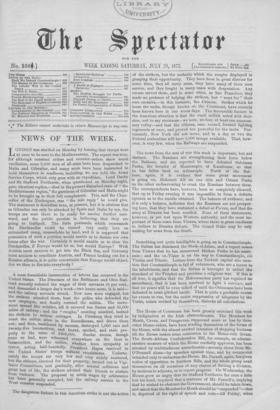A most formidable insurrection of labour has occurred in the
United States. The Directors of the Baltimore and Ohio Rail- road recently reduced the wages of their servants 10 per cent, and demanded a longer day's work—two hours more, it is said— and the railway servants struck. New men were engaged, but the strikers attacked them, beat the police who defended the new employs, and finally resisted the militia. The move- ment spread like wildfire, till it covered ten States and 50,000 miles of railway ; and the "roughs," scenting mischief, incited the strikers to serious outrages. In Pittsburg they tried to roast the militia alive in the Roundhouse, and drove them out; and then, maddened by success, destroyed 1,000 cars and twenty-five locomotives, and burnt, spoiled, and stole pro-
perty to the value of £800,000. Similar scenes, though none so bad, were witnessed everywhere on the lines in insurrection, and the militia, whether from sympathy or terror, acting half-heartedly, President Hayes resolved to use United States' troops without requisitions. Unfortu- nately the troops are very few and very widely scattered, but the citizens, alarmed for their property, turned out in Vigi- lance Committees, and gradually, after several collisions and great loss of life, the strikers advised their friends to abstain from violence. The proposal to settle wages by arbitration has been generally accepted, but the railway service in the West remains suspended.






























